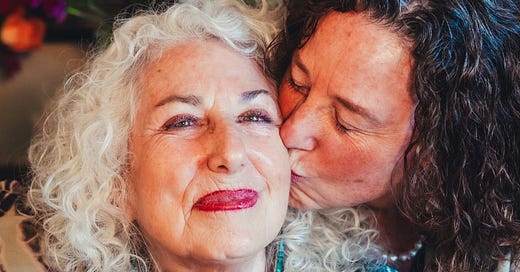When I was a little girl, most days were bright with beach outings, backyard games, and the joy of being with my mother, who could turn ordinary moments into magic. But every now and then, she’d get a migraine and retreat to her bedroom, needing stillness and quiet.
My dad, meaning well, tried to give my mom space and protect me from her pain, suggesting I go outside and play. Sometimes I did. But often, I stayed. I’d bring my mother tea, rub her feet, then sit quietly outside her door with a book while she rested.
This desire didn’t come from codependence, fear of abandonment, or the need to be needed. It came from care in its purest, most instinctual form—my heart simply wanted to be near my mother until her pain passed.
Looking back now, I believe that in some way, my quiet devotion was a kind of medicine. Because the body and the soul recognize love—even when it’s silent. Even when it’s small. Even when it sits cross-legged in the hallway, just outside your door, waiting for you to feel better.
Most of us are born with an innate capacity to care—a soul-deep knowing that rises naturally when we witness suffering. Whether we respond with action or simply presence, I believe this impulse to care is part of our sacred human nature. Yet, I see more and more, in Western culture, constant exposure to crisis and an overemphasis on individualism often dulls that instinct, leaving many unsure how—or if—they should respond. Caring and the wise actions that arise from it can be diluted and even lost.
Across the world’s wisdom traditions, caring for each other and heart-based action have always been honored. In Ubuntu, a philosophy from southern Africa, care is understood as the foundation of community. The word itself roughly translates to “I am because we are.” In practice, it means that the well-being of others is inherently tied to our own. In Ubuntu-based communities, if someone is struggling, the question isn't, Should I help? The question is, How can I help? One practice rooted in Ubuntu is the restorative village circle, where the community gathers not to judge or fix, but to listen and care together—bringing presence and healing through collective empathy.
In Tibetan Buddhism, a similar principle exists through the practice of Tonglen. When someone is suffering, practitioners are taught not to turn away but to breathe in that suffering and breathe out compassion. It is meant to soften the boundaries between self and other, allowing the heart to expand rather than close. Tonglen is an antidote to the helplessness we often feel in the face of another’s pain. It says: You can care. Your caring matters. And you can do something with it—even if it’s just one breath.
In Jewish tradition, there’s a sacred teaching called Bikur Cholim—the act of visiting the sick. It isn’t just a moral nicety; it is considered a mitzvah, a sacred obligation. The Talmud teaches that visiting someone who is unwell is like taking away one-sixtieth of their illness. The simple act of showing up, sitting quietly, or offering a bowl of soup becomes a conduit of healing—because presence itself is power.
What wisdom traditions recognize is that the heart knows what to do. It doesn’t always need a grand gesture. Sometimes, the greatest offering is genuine caring itself.
In my own life, I’ve come to see genuine care as my compass—a quiet, steady arrow that points me to what matters. It reminds me that care is not something we have to earn the right to give. It’s not a weakness, or a detour, or something reserved only for moments of crisis. Caring is the beautiful heart of our humanity.
Beneath the layers of overwhelm, the pressure to perform, and the cultural myth of self-sufficiency, care is waiting. It is the sacred thread that weaves us back together—within ourselves, with one another, and with something greater than us all.
Caring is the sacred essence beneath the ego and the all-powerful Western ideal of “It’s all about me.”
To reclaim your relationship with this sacred instinct, begin by noticing the moments when your heart stirs. Just pause, and ask: What does love want to do right now?
Then trust what arises.
Let it be simple. Let it be real.
Let it grow you.
Because when we let our caring guide us we come home to a truer way of being.
One that heals. One that connects. One that grows the heart.





Thank you for sharing your story and the wisdom streams that mirror it!